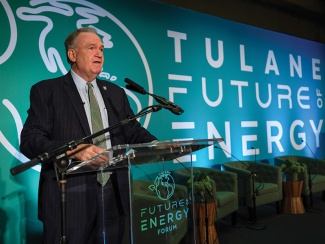Building on this strong foundation, we launched the Future of Energy Forum last fall. This marquee event incubates dialogue and exchange among thought leaders, experts and stakeholders from business, government, academia and nonprofits. The inaugural forum drew over 900 registrants and featured 100 speakers and panelists, including the former governor of Louisiana and the former U.S. Secretary of Energy.
Among the panelists was Ken Ahmann, who was hired in 2004 to build a power plant for the
Cachil DeHe Band of Wintun Indians. The tribe was experiencing over 50 outages per year, so they decided to build their own energy infrastructure. Twenty years later, Ken is the COO of Colusa Indian Energy, the only tribally owned micro-grid developer in the United States. By literally empowering their community, the tribe now operates 100 percent off-grid, and they’ve had zero power outages over the last 12 years.
On Tulane’s campuses, we’ve partnered with ENFRA (formerly Bernhard, LLC) on Project RISE, a 30-year Energy-as-a-Service agreement that hardens our infrastructure against weather events and local power failures. By improving efficiency and expanding our energy sources, we are reducing our carbon footprint even as our physical footprint continues to grow.
In tandem with our operational progress, the Future of Energy Forum advances Tulane’s leadership in the energy expansion. It joins a number of university initiatives that are bridging the gap between our academic output and real-world needs across countless critical areas. Like energy itself, our research is a vital resource that is essential to our future.
So, we are hardening our research and educational infrastructure as well. We’re leaning into what already powers us, revitalizing our downtown campus to exponentially increase biomedical and clinical research and establish a national hub of discovery and innovation. At the same time, we’re launching more interdisciplinary centers, commercializing new technology, and preparing students to lead for the future.
Fueled by our unique creativity, culture and expertise, we are expanding what’s possible through a broader array of opportunities. The Louisiana Promise is building new educational pathways and helping more students from our home state realize the dream of a college education. New academic programs from landscape engineering to nursing are addressing vitally important needs, and presidential chairs are attracting internationally renowned faculty who are making breakthrough discoveries in areas ranging from biomedicine to flood prevention.
All of these achievements are driven by the students, faculty, staff and alumni who bring their own energy and passion to carrying out our mission. Our task is to build and maintain a university that supports the transformation of this energy into life-changing ideas and innovations. We are well on our way.































































